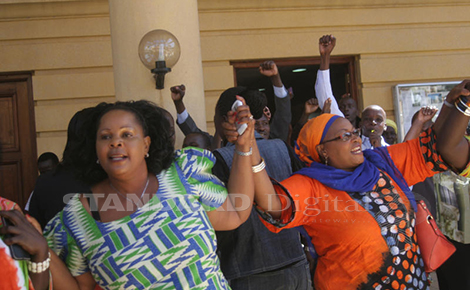×
The Standard e-Paper
Home To Bold Columnists
 |
| CORD supporters celebrate Friday after the High Court suspended implementation of some of the security laws enacted recently. [PHOTO: ELVIS OGINA/STNADARD] |
NAIROBI: The High Court has suspended implementation of eight controversial clauses in the Security Laws (Amendment) Act and subsequently asked Chief Justice Willy Mutunga to constitute a three-judge bench to consider a petition by the Opposition challenging the new laws.
And there were celebrations among CORD supporters after the High Court halted operationalisation of various clauses, which came into force after the controversial Act was signed into law by President Uhuru Kenyatta.